 Petzlover
Petzlover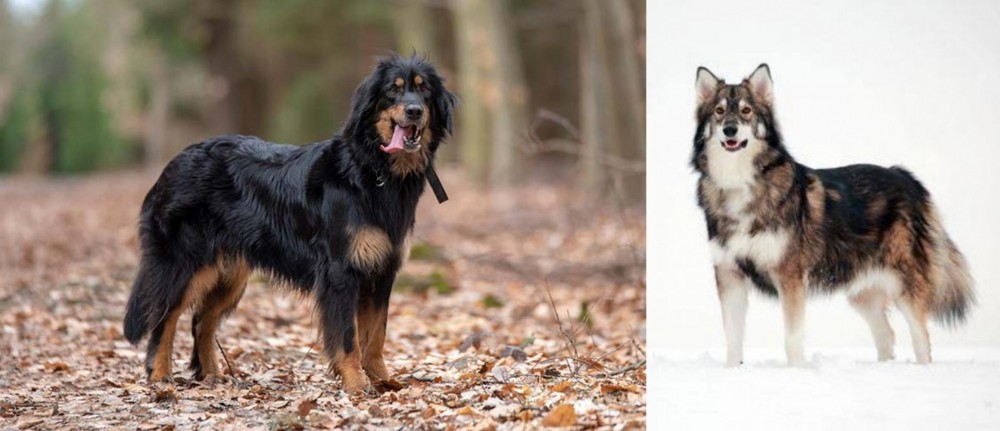 Hovawart is originated from Germany but Utonagan is originated from United Kingdom. Hovawart may grow 14 cm / 5 inches shorter than Utonagan. Hovawart may weigh 11 kg / 25 pounds more than Utonagan. Both Hovawart and Utonagan has almost same life span. Both Hovawart and Utonagan has same litter size. Hovawart requires Low Maintenance. But Utonagan requires Moderate Maintenance
Hovawart is originated from Germany but Utonagan is originated from United Kingdom. Hovawart may grow 14 cm / 5 inches shorter than Utonagan. Hovawart may weigh 11 kg / 25 pounds more than Utonagan. Both Hovawart and Utonagan has almost same life span. Both Hovawart and Utonagan has same litter size. Hovawart requires Low Maintenance. But Utonagan requires Moderate Maintenance
 The Hovawart, is a German Black Forest breed developed as a guard dog for large estates in the medieval era. They first appeared in history in the early 13th century as heroes who saved the German son of a castle lord, despite being injured themselves. The boy they saved grew up to be a German legend. He wrote the oldest German code of law that remained from medieval times. In it he names the Hovawarts as a dog that if you are responsible for hurting, stealing or killing it, you must pay for it or replace it. No other dog had this protection.
The Hovawart, is a German Black Forest breed developed as a guard dog for large estates in the medieval era. They first appeared in history in the early 13th century as heroes who saved the German son of a castle lord, despite being injured themselves. The boy they saved grew up to be a German legend. He wrote the oldest German code of law that remained from medieval times. In it he names the Hovawarts as a dog that if you are responsible for hurting, stealing or killing it, you must pay for it or replace it. No other dog had this protection.
In the late fifteenth century Hovawarts were featured in Heinrich Mynsinger’s “The Five Noble Breeds”. This guard dog breed was esteemed on a level with the hunting dogs – their health a question of life or death for their owner. In the 1500’s the popularity of the breed began to fade. The GSD or German Shepard Dog began to replace the Hovawarts as the preferred guard dog.
By the early 20th century the breed had almost disappeared but were saved by breed enthusiasts in the early 1900’s. Zoologist Kurt Konig was prominent in this effort and went looking in the Black Forest area for dogs working on farms. Using the dogs, he found on these farms, Konig began a breeding program crossing the them with Newfoundland’s, Kuvazoks, Leonbergers, GSD, an African hunting dogs and Bernese Mountain Dogs.
By 1922 the first litter of these pups was entered officially into the German Breeding Registry. In 1937 the Hovawart was recognized by the German Kennel Club. However, many members of the breed died in World War II as they were used widely by the military and not many were left by 1945. Once again breed enthusiasts came to the rescue forming a Coburg Hovawart club. This club still exists and in 1964, for the second time, the breed was recognized by the German Kennel Club. Other countries also began to take notice of this working breed.
The Hovawart has many skills in addition hunting and guarding. The Hovawart does not work for people, he works with them as he is a very independent thinker. He is also good at search and rescue and tracking. An owner of this breed must be stronger, smarter, more alert, intentional and consistent than his Hovawart. These are not dogs for the faint of heart or first-timers.
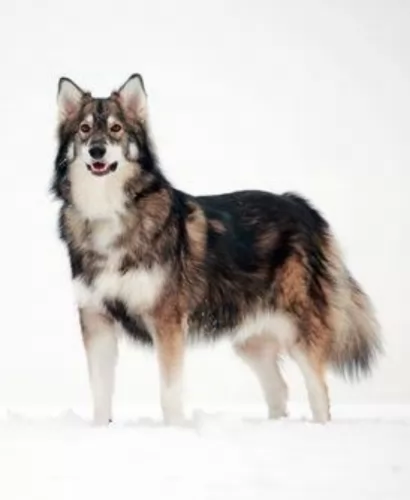 The Utonogan is such a wolf-like dog, you couldn’t be blamed for thinking you’d come face to face with a true wolf. They’re a rare dog breed that came about from crossing the Siberian Husky, the German Shepherd and the Alaskan Malamute.
The Utonogan is such a wolf-like dog, you couldn’t be blamed for thinking you’d come face to face with a true wolf. They’re a rare dog breed that came about from crossing the Siberian Husky, the German Shepherd and the Alaskan Malamute.
The dog was developed by Edwina Harrison and it was in the 1980s that the dog was introduced into the UK.
The Utonagan is a rare dog with only a few breeders. Take care with where you buy your Utonogan from and certainly steer clear of backyard breeders or puppy mills.
 The Hovawart is a proud and majestic dog and his looks match his character. He looks a bit like the Golden Retriever with a powerful and broad forehead. His skull and muzzle are the same length and his nose is black. His oval eyes are a medium to dark brown and his ears are high set and triangular.
The Hovawart is a proud and majestic dog and his looks match his character. He looks a bit like the Golden Retriever with a powerful and broad forehead. His skull and muzzle are the same length and his nose is black. His oval eyes are a medium to dark brown and his ears are high set and triangular.
Their chests are strong, broad and deep. The breed has strong legs straight in front with round, strong and compact feet. They are heavy boned with dense, long coats that lie flat and have a slight wave to them. The coat can be black and gold, blond or black.
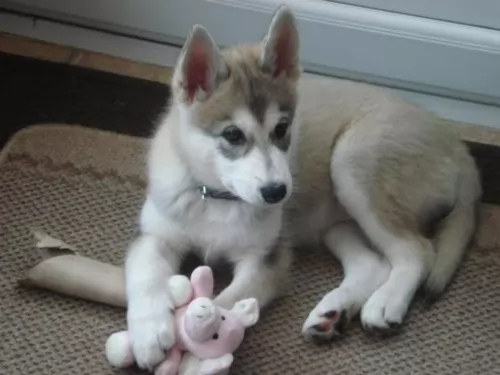 These dogs are large and lean, looking vibrant and strong. They stand at between 63-84 cm in height and weigh roughly between 32-40 kg.
These dogs are large and lean, looking vibrant and strong. They stand at between 63-84 cm in height and weigh roughly between 32-40 kg.
The body is long with strong but slender legs with webbed paws. They look like wolves with the sharp muzzle, the erect ears, bushy tails and slanted eyes with black eye rims. The double coat is thick and straight. Colors of the coat can be silver or gey, cream, brown, or black. The coat becomes thicker in the Winter.
The Utonagan is a very social dog, wanting to spend a lot of time with his human family. They have so many excellent qualities that make him a splendid pet - loving, loyal and gentle.
Whether you have other pets in the home or children, he is a dog that is able to get on with everyone. He is wary of strangers though and with training ad socialization he is going to be the most fantastic pet and companion.
 They have a great sense of smell and a well-balanced personality.
They have a great sense of smell and a well-balanced personality.
They are not indoor dogs and should have a yard to run in. They do not tolerate hot weather well. They do great out in the country.
They are intelligent independent thinkers. They lengths well with positive reinforcement.
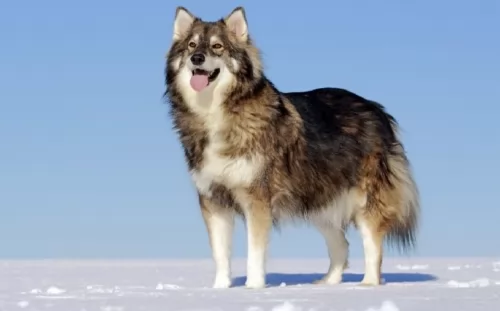 The Utonagan is an intelligent dog and also very social and people-oriented. He wants to be part of his human family, with a friendly, playful nature.
The Utonagan is an intelligent dog and also very social and people-oriented. He wants to be part of his human family, with a friendly, playful nature.
He will certainly not like being left alone and outside day after day. He can become frantic with frustration and this can be laid at the feet of an irresponsible dog owner.
Give him the life he wants and deserves, and this beautiful wolf-like dog will be your friend for life.
 Though their isolation protected them from genetic health issues for centuries, once they were being rejuvenated and mixed with other breeds some common issues began to show up. These include:
Though their isolation protected them from genetic health issues for centuries, once they were being rejuvenated and mixed with other breeds some common issues began to show up. These include:
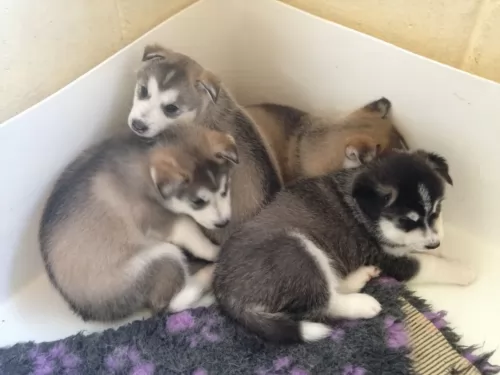 Yur Utonagans can live to be between 12 and 15 years of age, but a few issues can include cancer and joint dysplasia.
Yur Utonagans can live to be between 12 and 15 years of age, but a few issues can include cancer and joint dysplasia.
Cancer is a major cause of death in dogs old and young. There also seems to be some dog breeds that are more prone to cancer than others.
Thankfully most of the cancers are curable if you get them in the nick of time. The warning signs of cancer in your dog is much the same as with people and you’ll discover a new lump on your pet or a wound that simply won’t heal.
When you detect that your pet is lethargic and not acting his usual perky self, it is time to get him immediately to the vet.
 Feed breed specific high quality dry food for puppies. Feed 1-2 cups in 3-4 meals per day
Feed breed specific high quality dry food for puppies. Feed 1-2 cups in 3-4 meals per day
Again Feed breed specific high quality dry food for adults. Feed 2-3 cups per day in 1-2 meals per day.
Points for Good Health – Stamina
The Hovawart needs plenty of exercise. Remember this is a mountain farm dog used to working all the time. Walk or jog with them daily. They can excel at field trials, obedience, search and rescue, agility, flyball, therapy dog, and service dog.
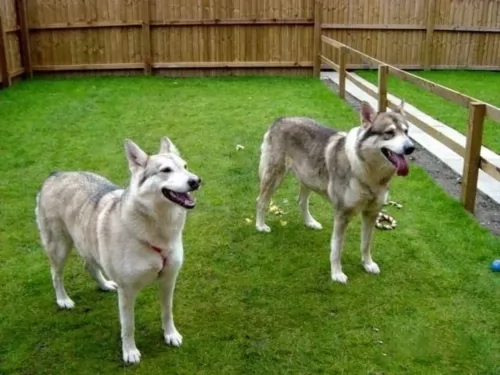 These are very high energy dogs and they will need exercise every day. While they will love a walk, they would be happier with something more vigorous such as a hike.
These are very high energy dogs and they will need exercise every day. While they will love a walk, they would be happier with something more vigorous such as a hike.
Swimming, ball games and hide and seek will all need to be on this dog’s menu of events. It is why it’s a dog that is better suited to life in the country as opposed to life in the city.
If you opt to buy this dog commercially manufactured food, he will need to have a high quality one high in vitamins and minerals and designed for energetic dogs. Try and avoid the inferior brands as they are packed with ingredients that can be of no value to your pet. There are ingredients which can actually make him sick.
Home-made food is always a good thing for dogs, especially when it is simple, nutritious food that won’t aggravate the stomach.
You can’t go wrong with foods such as boiled chicken, brown rice, and vegetables such as spinach, carrots and sweet potato. A little bit of raw meat added in occasionally can be excellent as well. Always make sure that a bowl of fresh water is available to your pet around the clock.
This is such a beautiful dog, you want to keep him that way. His thick coat is going to require regular brushing to keep it free from matting. Not only that, grooming stimulates the skin. You can also check him over at the same time for ticks and fleas and make sure there aren’t any unusual lumps on the body.
This type of dog values the grooming session as it is a bonding time for him, making him that much happier and content.
Other grooming needs will include taking care of his nails and checking inside his ears and mouth for signs of infection.